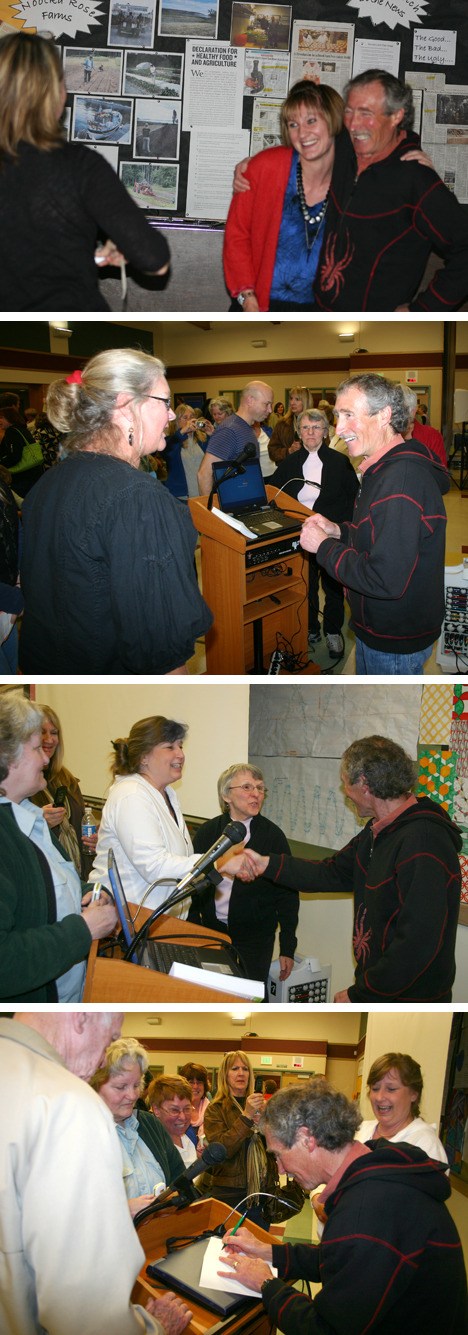He entered the room pumping his fist, and fans cheered.
Someone called out, “I’m your biggest fan.” Admirers sought pre-performance autographs and photographs. When his performance — or presentation — neared its end after 90 minutes, fans called out, “No! No!,” and he gave them 30 minutes more.
Afterward, he was mobbed. He was invited to play in the local celebrity golf classic.
A rock star? Yes — of the gardening world. This was Ciscoe Morris, and he rocked the Friday Harbor High School Commons with his abundant energy, equally abundant humor, and even more abundant gardening advice.
Morris’ appearance was sponsored by the San Juan Island Library, Friends of the San Juan Island Library, Master Gardeners of San Juan County and the San Juan Island Horticulture Society. Some 178 people had reserved seats, but 200 people were expected — almost enough to fill the San Juan Community Theatre.
With slideshow, Morris reviewed 139 plants in “The Good, the Bad, and Why Did I Plant That?” Scientific names like “Embothrium coccinium” and “Dicentra Spectabilis” rolled off his tongue with as much ease as “Ooh, la la.”
His advice was like manna for island gardeners: He talked about dry shade plants and drought tolerant plants, plants that provide good color in winter, and plants that attract hummingbirds. And, of course, plants that are deer resistant.
He gave advice on potential gardening dangers (euphorbia’s sap is caustic; if you’ve been handling it, don’t wipe your brow with your sleeve or you risk getting blisters on your face).
He also dispensed some gardening secrets (You can get rid of ivy by mowing it; it becomes a lawn. Alfalfa meal is a great fertilizer. Straight white vinegar on a hot sunny day is the best weed killer and will kill thistle. Many wildflower mixes for Western Washington contain noxious weeds, so beware. Hummingbirds loved clotheslines. Bees love plants that are blue; “If you plant blue things, you’re going to get bees.”).
He was just plain funny too. If you’re using vinegar to kill weeds and you have a date that night, make sure your date likes pickles because you’re going to smell like “Eau de gherkins.” Juniper is pronounced “you-niper” in Ballard, a nod to that town’s Norwegian heritage (Morris is a native of Wisconsin).
His favorite hedge is a fence. “It gives you privacy, you can make it any way you want, they are beautiful and you don’t have to prune them.” Art can add elegant to any garden — but avoid plastic flamingos.
About his characteristic “Ooh, la, la!” Morris and his wife were bicycling in Southern France and they stopped to use a roadside restroom. He tried to save two francs and used the restroom after his wife, but after he entered and she exited the door locked — it was a self-cleaning restroom. Morris was drenched by the cleansing water sprays.
When he exited the restroom, a Frenchman saw him standing there, drenched, and exclaimed, “Ooh, la, la!” Morris adopted the phrase.
For a quarter-century, Morris was head of the grounds crew at Seattle University. He debuted on the “Northwest Home and Garden Show” on Channel 7 in the 1980s; the host was Jeff Probst, who now hosts “Survivor.”
“See what I did for his career?” Morris quipped.
Today, KING 5 airs Morris’ gardening segments with Meeghan Black as well as his weekly show “Gardening with Ciscoe.” His book, “Ask Ciscoe,” was among the top-selling garden books nationwide. In addition, he has co-authored books on roses and perennials, and he also writes a garden column for the Thursday edition of The Seattle Times.
Morris spent the day before his evening presentation hiking the Cattle Point area — from the lighthouse to “where that guy shot the pig.” He was thrilled by the thrift he saw on his hike.
Morris is familiar with Cattle Point; he said he used to SCUBA dive in the area.
Morris’ presentation kicks off a series of workshops. Coming up: “Landscape Design” with Colleen Howe-Gregory, March 27, 10 a.m. to noon, in the San Juan Island Library; and the Master Gardeners Spring Workshop, April 17, 9 a.m. to 4:30 p.m., Mullis Community Senior Center. For information about these and other gardening workshops, call WSU Cooperative Extension, 378-4414.



